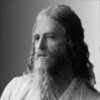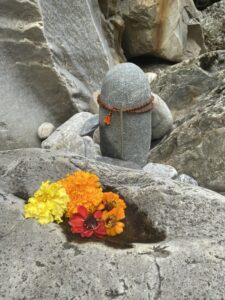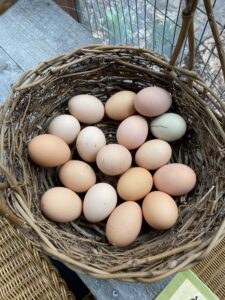A guy was driving his truck down the road when he blew a tire. He got out to fix the flat and, drats, he didn’t have a jack to complete the task. He saw a farmhouse up ahead a bit, so he walked towards the place to borrow the tools he needed.
Walking along, he began to curse his fate. Seemed to him like something was always going amiss. One day it was a flat tire, the next an aching back, then there’s trouble with money, his wife can be unreasonable, his boss didn’t appreciate him, and other such woes. By the time he got to the farmhouse, he had worked himself into quite a foul mood. He convinced himself the world was against him and people were no darn good. He even convinced himself that the folks at the farm would be rude and unkind. He knocked on the door of the home and when the housewife opened and kindly asked, “Can I help you?” He responded by declaring, “You can keep your stinkin’ jack. I don’t want your help anyway!”
The yoga sages tell us the creation is a lila, a divine play, a sporting adventure of God designed to enhance divine love and beauty. For most of us, though, life doesn’t seem like any kind of play, it feels more like an enhancement of stress, frustration, and pain. Why this discrepancy between the teachings of the yogis and our personal experience? The sages tell us the problem is that we live in an illusion of our own making. Like our friend with the flat tire, we get ourselves riled up to the point where we curse our imagined fate and compound our difficulties. How did we get into this mess and, more importantly, how can we get out?
The great yogis and yoginis I have met all share a number of characteristics: kindness, wisdom, devotion, compassion, and in many ways the most important quality, a playful sense of humor. This sense of humor enables them to see the world in a true manner. They have the vision of dharma, the way things are. Perhaps laughter is not only the best medicine, it may well turn out to be a key to spiritual development.
The yoga scriptures tell us that God-consciousness is a state of timeless awareness, of stillness, silence, completeness, and love. In this consciousness, a ripple arose; lahari, a spontaneous vibratory wave that produced the idea of multiplicity. The sages describe this wave as the primal energy, the original idea, after which followed all other thoughts and initiatives. There are numerous yogic myths that attempt to describe how the one complete divinity became the multiplicity. I would like to present the myth in a contemporary form, Before I do, please understand that myths are not beholden to historical or ontological facts. They are designed to convey a truth that is greater than words can describe.
Once, in a time and place beyond time and space, God said, “Knock, knock.” We, the various souls – the waves on the ocean of God — responded, “Who’s there?” Then God laughed and laughed. What a comical riot, integral parts of His own whole and complete consciousness asking “Who?” God, though, was polite enough to keep the laughter within and remained silent, waiting for the joke to hit. In fact, God continues to laugh and remain silent, still waiting for the joke to hit.
We, on the other hand, not appreciating the humor inherent in the question, took it very seriously. We entered into creation, the realms of form, to search everywhere trying to figure out the riddle, “Who am I?” “Who are you?” “Who’s there?” Our lives, our problems, even our spiritual aspirations, have become seemingly weighty and important matters. We frantically try to solve the confusion and dilemmas of our life, chasing after various external solutions. In the pandemonium, we find ourselves separated from the two divine qualities which could be our path back to the Kingdom of Heaven: silence and humor.
So, what to do? Let’s begin by developing the two traits of silence and humor, so evident in heaven, so lacking in this world. Silence is cultivated through sadhana, spiritual practice. Asanas, yoga postures, quiet the body, and meditation quiets the mind. When there is quiet, tensions and anxieties are unwound, and consciousness reveals its foundation. The underlying base on which our thoughts arise is our svarupa, essential nature, the unitary divine consciousness we call God, the foundation of all beings.
As we relax and awaken to our true being, we develop drishti, true vision, and we can actually see the divinity of all beings. Not as an idea or imagination, but as sat, the truth, reality. Inherent in sat is shivam, kindness, and sundaram, beauty. When we see ourselves, other beings and all of creation filled and permeated by the truth of kindness and beauty, it is an easy matter for love to arise. When the light of love is present there is no darkness. The hullabaloo of imagination is gone.
In a world of impermanence, there will always be flat tires and other mishaps. Our goal as spiritual aspirants is not to create a perfect utopia where unpleasant things do not occur. This is impossible. Our goal, rather, is to accomplish the possible: to realize the divinity within and perceive divinity without. Then all is known as God.
By nurturing inner silence through spiritual practice, God can be reached. Then, the next time we hear a good “knock-knock” joke, we will appreciate who – Who, indeed! — is asking the riddle. How easy and spontaneously our laughter will then arise, and we will take our rightful place in God’s band of the wise and light-hearted.




